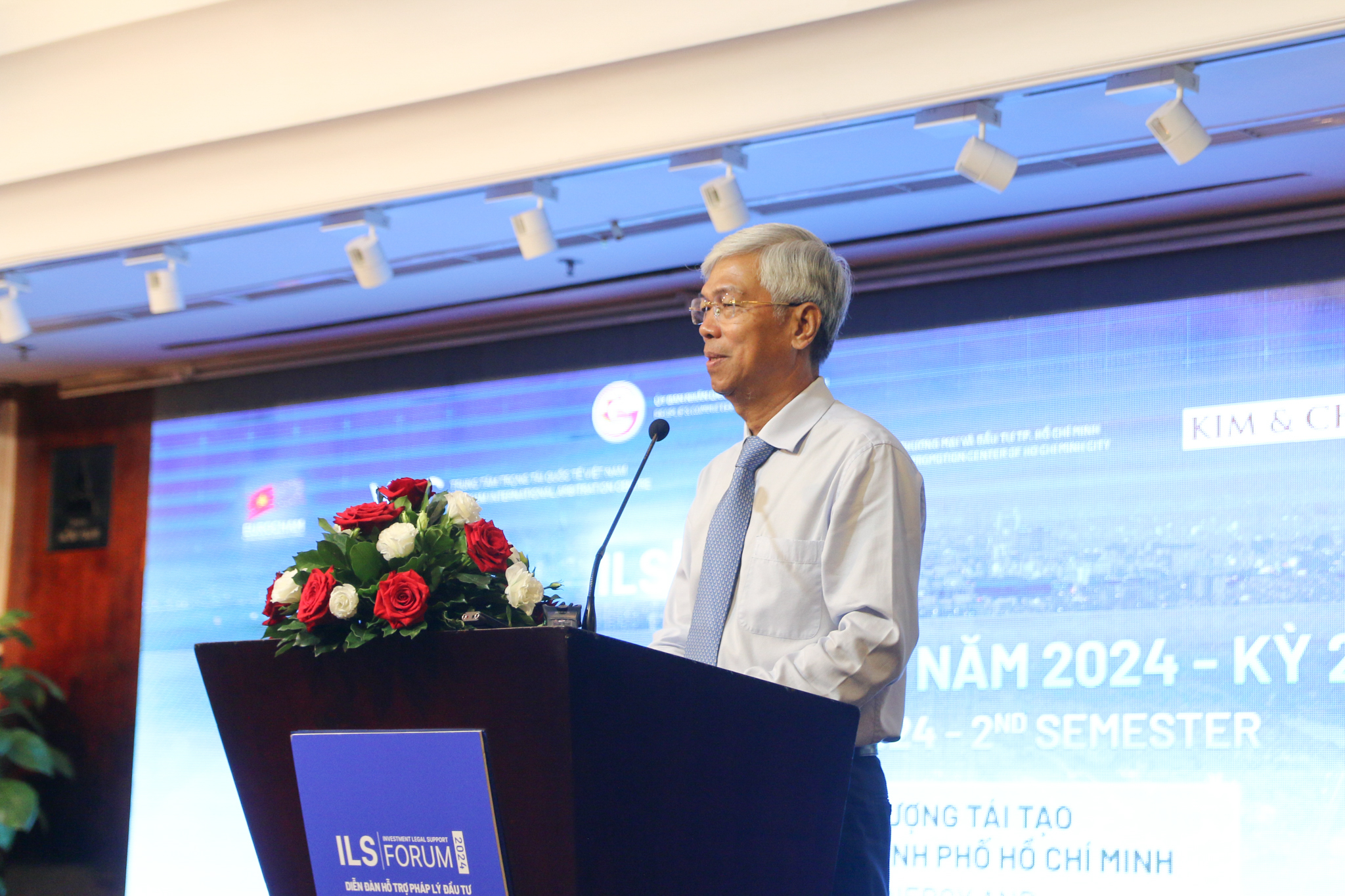
H.E Võ Văn Hoan, Vice Chairman of the Ho Chi Minh City People's Committee, delivered a directive speech at the forum. Mr. Hoan remarked that sustainable economic development is a model that many countries around the world are striving towards, and Vietnam in general, as well as Ho Chi Minh City in particular, are not outside this trend. He informed the conference that recently, Ho Chi Minh City issued the Green Growth Action Plan for the 2024–2030 period, aimed at implementing the National Strategy on Green Growth, targeting sustainable development in Ho Chi Minh City from 2021 to 2030. Accordingly, the city has identified 14 main task groups emphasizing the "green" element in development, with a particular focus on the importance of renewable energy projects. Thus, with the Green Growth Action Plan for 2024–2030 and the special mechanisms and policies from Resolution 98/2023/QH15, Ho Chi Minh City has established the necessary frameworks to promote green projects within the city. However, the city still has concerns regarding whether the favorable policies are enough to ensure smooth implementation of renewable energy projects and foster green economic growth in Ho Chi Minh City for investors. Therefore, Mr. Hoan welcomed the idea of organizing the forum, seeing it as an opportunity for the city to come closer to and listen to investors’ opinions, which will lead to reforms in the investment and business environment in the city.

In his opening remarks at the forum, Dr. Trần Du Lịch, Vice Chairman of the Vietnam International Arbitration Centre (VIAC), noted that promoting the development of renewable energy, especially sources like wind, solar, and biomass energy, not only helps mitigate environmental impacts but also creates a significant advantage for localities and nations in the global greening trend. However, as of now, terms like “greening” or “renewable energy” are still not very familiar to businesses; the regulatory framework for this sector in Vietnam is also incomplete. This has resulted in situations where there is a desire to act, but it either cannot be done or is delayed due to regulatory obstacles. Moreover, the lack of regulations and guidelines increases the risk of disputes, causing concern for both investors and the state. Mr. Lịch acknowledged that Ho Chi Minh City holds many advantages, having been granted permission to pilot special mechanisms, including those specific to the development of renewable energy projects. However, due to common policy barriers, the process of implementing Resolution 98 in this field faces many challenges. From this, Mr. Lịch emphasized that city authorities and the business community must work together to assess the issues and find solutions. He also expressed his hope that experienced experts, particularly in the legal field, could accompany and advise the city in its efforts to attract investment and implement renewable energy projects, ensuring the investment process and operations proceed safely and protect the rights of all stakeholders.
The forum was structured with two main parts: (i) Analytical reports from investors and experts, and (ii) Forum dialogue focused on aaddressing the issues that investors and the city government concerned about during the implementation of renewable energy projects in Ho Chi Minh City.
At the beginning of the report, leaders representing the Working Group: the European Chamber of Commerce in Vietnam (EuroCham) – Leaders representing the Specialist Group: Kim & Chang Vietnam LLC provided an overview of the status of renewable energy project implementation in recent times.
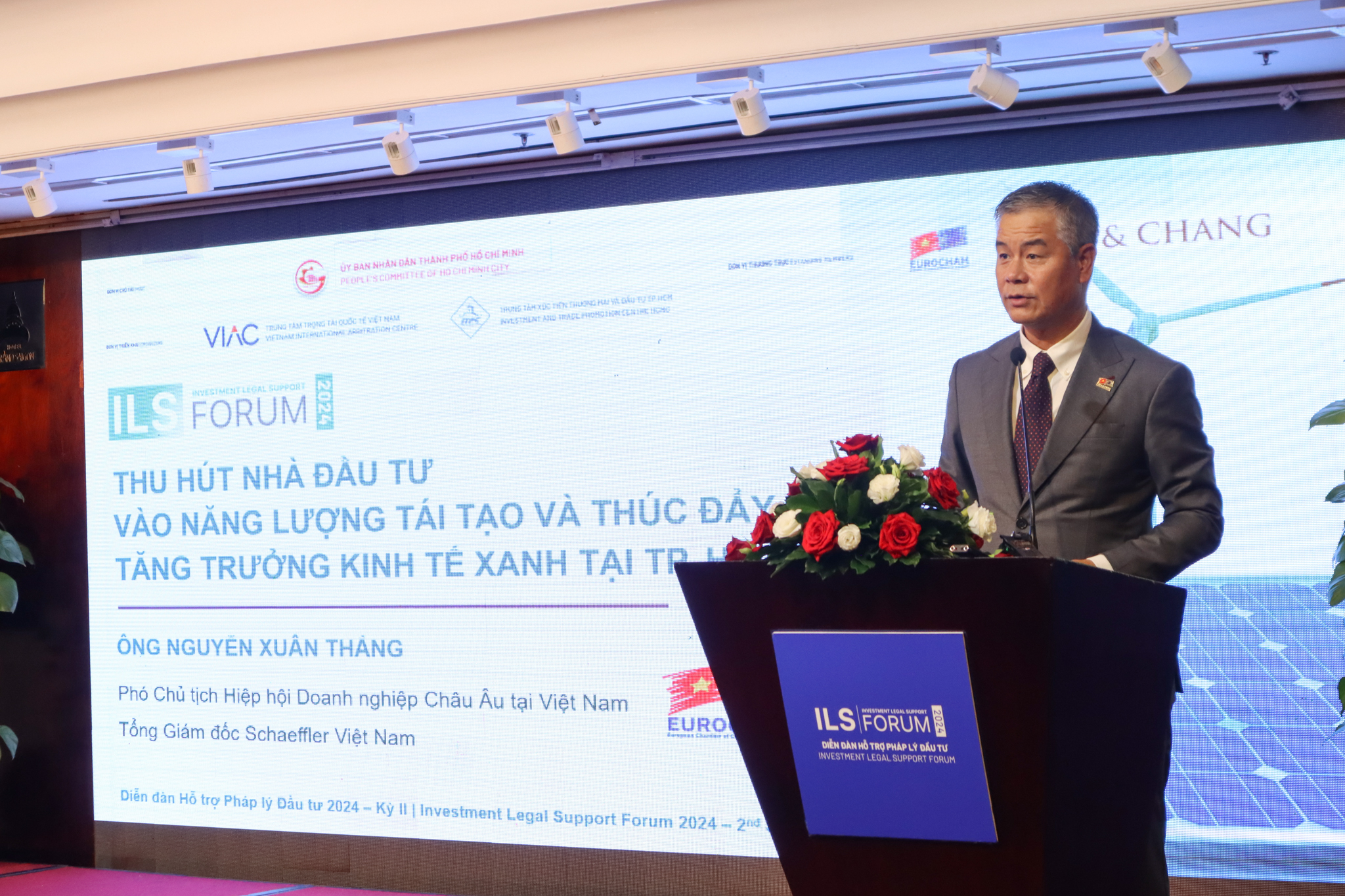
From the investor's perspective, Mr. Nguyễn Xuân Thắng - Vice Chairman of the European Chamber of Commerce in Vietnam (EuroCham Vietnam), Managing Director at Schaeffler, and leaders representing the Working Group observed positive signals and praised the city’s efforts in realizing regulations to promote green investment in Ho Chi Minh City in accordance with Resolution 98/2023/QH15. Regarding project types, Mr. Thắng indicated that investors are currently focusing heavily on solar energy projects. However, he also emphasized that to ensure confidence among parties for the effective implementation of these projects, investors hope for a more effective cooperation mechanism between private investors and state agencies. One of the challenges mentioned relates to delays in issuing regulations and guidelines for implementing solar power projects, which are still being drafted. This not only creates a bottleneck for investors operating solar energy projects post-2020, but also raises concerns for investors wishing to launch new projects in the near future. Additionally, the manner in which investors access projects is also an issue that needs further detailed discussion. Mr. Thắng cited several successful international models from countries such as Singapore and India to illustrate and suggest that Vietnam should consider applying these models.
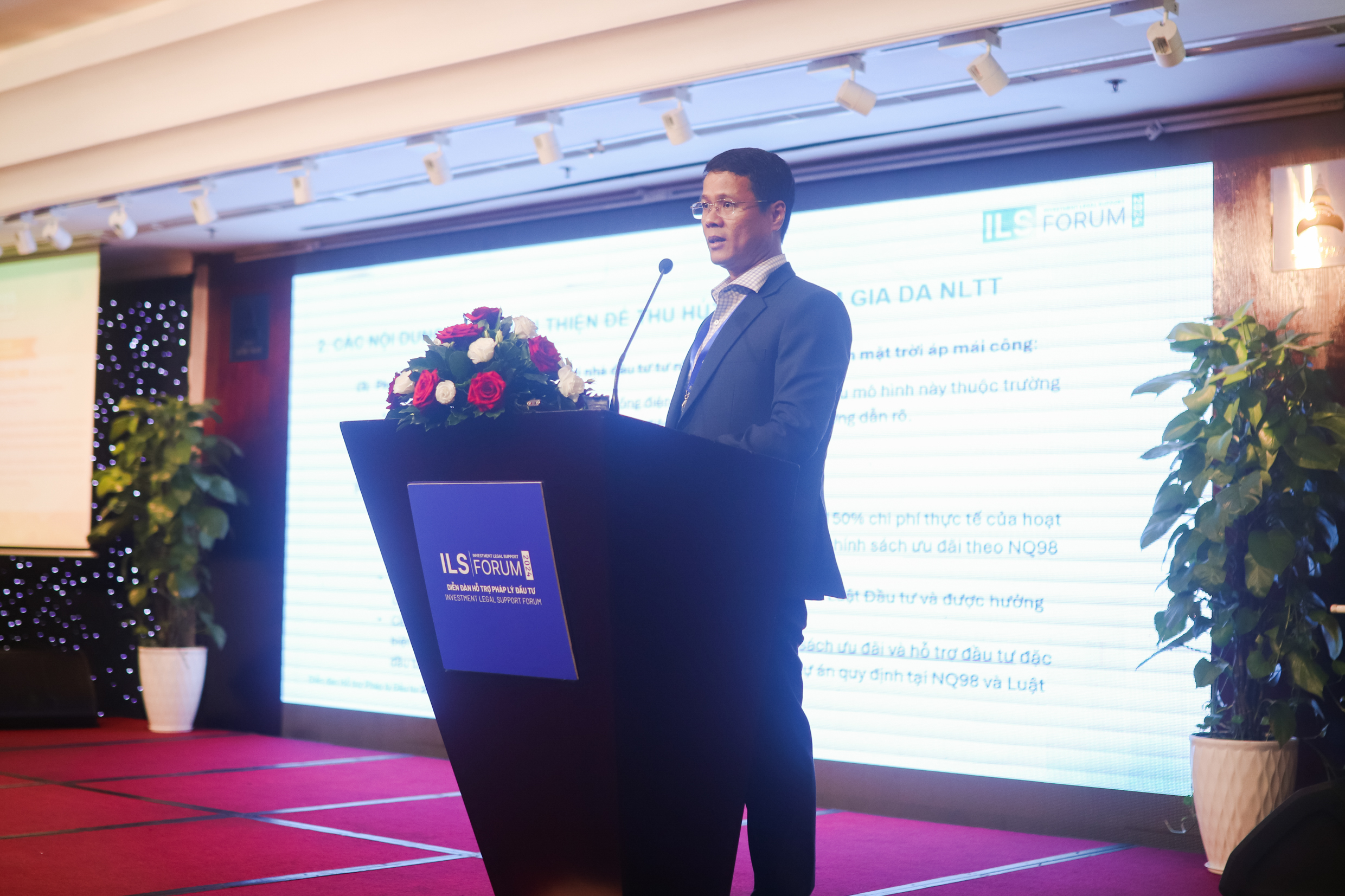
Following the presentation by the Head of the Working Group, Mr. Nguyễn Đức Minh – Foreign Attorney at Kim & Chang LLC (Vietnam), and representative of the Forum’s Specialist Group, delivered a report on the application of legal regulations in renewable energy projects in Ho Chi Minh City over recent times. Analyzing the current regulations, Mr. Minh pointed out the limitations within the legal framework, highlighting the need for a dedicated law governing renewable energy. According to Mr. Minh, a project in this sector is currently governed by a multitude of fragmented regulations across various laws. This fragmentation inadvertently creates difficulties for businesses during investment implementation, especially as Vietnam’s legal framework contains overlapping provisions and has not yet caught up with practical needs. Another issue raised by Mr. Minh concerns the Power Purchase Agreement (PPA) template. Presently, all PPAs must follow a standardized template, which severely restricts negotiation between the parties. As a result, there is a real risk of imbalance in the rights and benefits of the parties; even more concerning, many international lenders refuse to provide funding because the PPA template does not meet their standards.
Thus, Ho Chi Minh City, with the support of Resolution 98, needs to take more decisive and bold steps to leverage the advantages of its unique mechanisms. Mr. Minh suggested that the city should promptly announce a list of renewable energy projects and provide clearer guidance on procedures and processes, such as selecting strategic investors, defining the scope of investment cooperation, or formulating incentive policies.
At the Preliminary session of the Forum, held on September 12, 2024, several issues were discussed, refined, and selected for in-depth discussion at the Plenary Session, including:
Following the group leaders' overview reports, the Forum delved further into these issues.
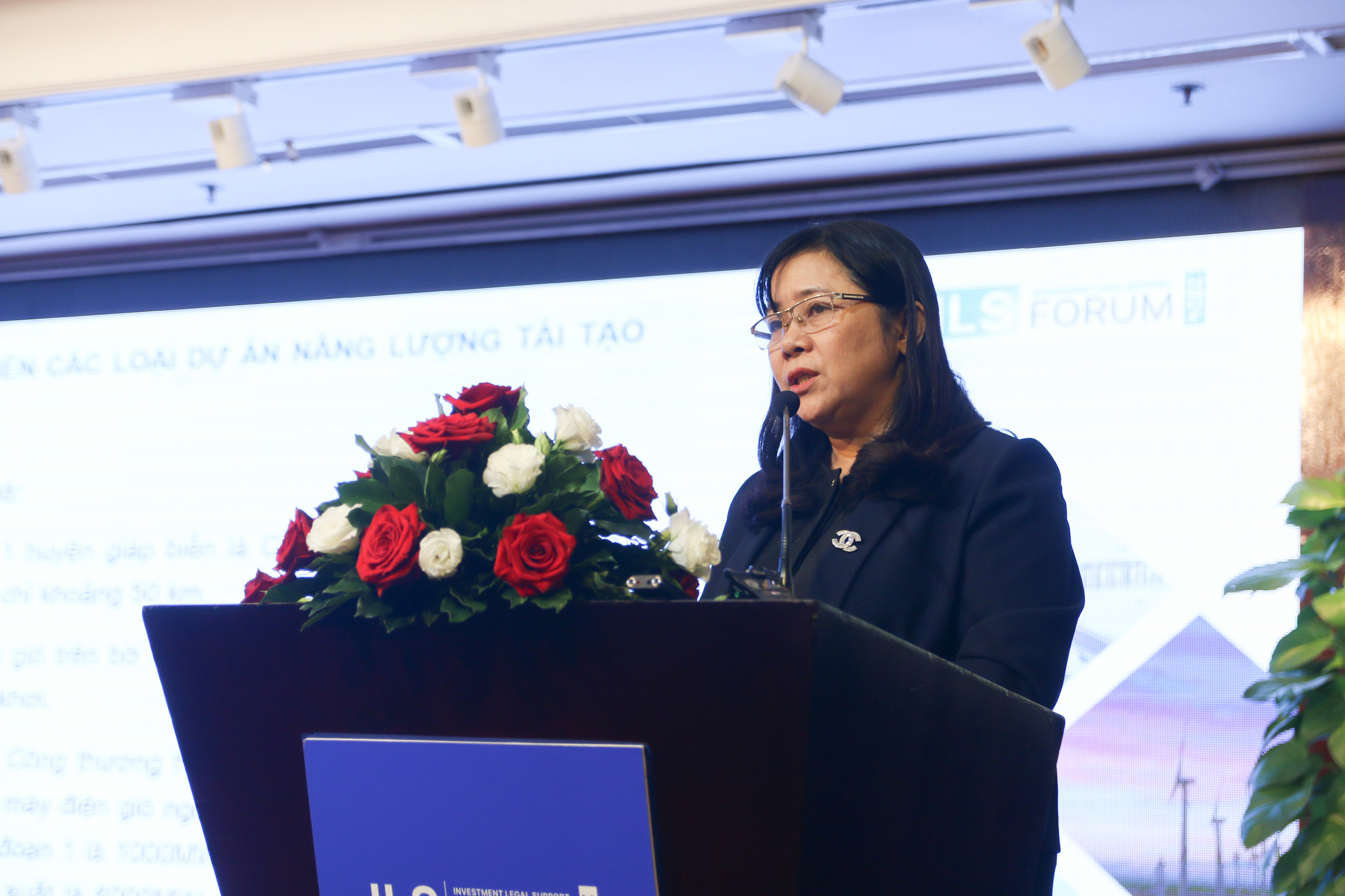
Ms. Nguyễn Thị Kim Ngọc, Deputy Director of the Department of Industry and Trade of Ho Chi Minh City, provided an update on the progress of renewable energy projects in Ho Chi Minh City, as well as the challenges the city is facing in developing green projects. Ms. Ngọc noted that, as a special urban area with a dense population, Ho Chi Minh City has a very high energy consumption demand. However, due to its geographical characteristics, the city lacks the strengths needed to develop many types of energy that are widely used across the country. Recognizing its limitations in terms of available land and taking advantage of its strengths and the unique mechanisms provided by Resolution 98, the city is aiming to focus on the development of rooftop solar energy and energy generated from solid waste (waste-to-energy) in the near future. Additionally, the city is also considering offshore wind power development when economic and technical conditions allow. To move towards this objective, both the government and investors need to work together to research and resolve any outstanding issues in order to effectively implement renewable energy projects in the city.
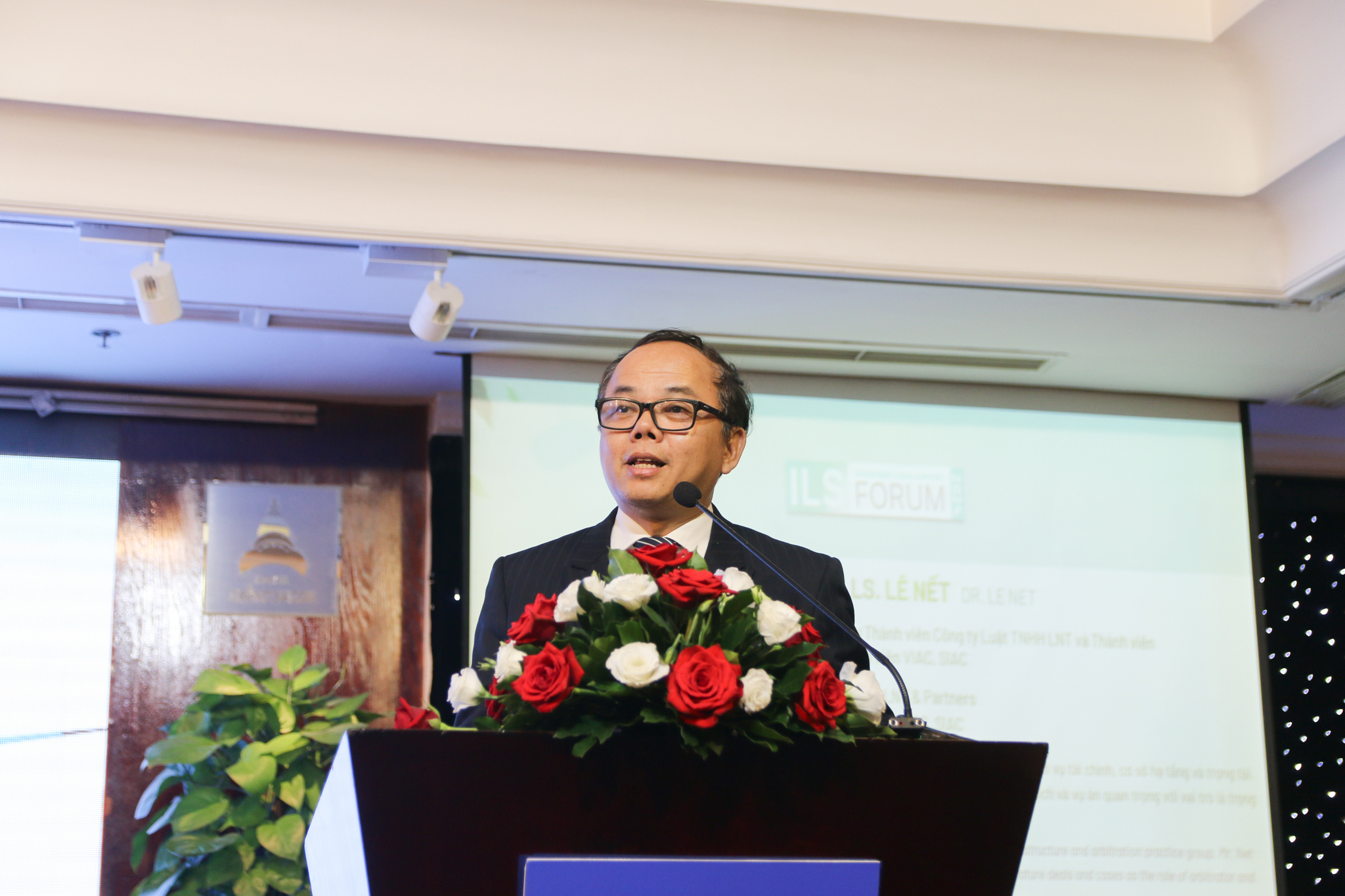
Commenting on the regulations governing investment in rooftop solar power projects, Dr. Lê Nết, Partner of LNT & Partners, Arbitrator of the Vietnam International Arbitration Center (VIAC), stated that currently, the implementation of projects in this field is primarily governed by the Electricity Law and several decrees and decisions. Specifically, Circular 18/2020/TT-BCT, amended by Circular 01/2023/TT-BCT, provides specific regulations for solar power projects. It is known that the Ministry of Industry and Trade is in the process of drafting a new Decree Proposal on mechanisms and policies for the development of rooftop solar power. However, in general, these projects are facing obstacles due to a lack of legal regulations. Specifically, newly invested rooftop solar power systems currently lack regulations on the sale price to EVN, and existing laws also limit power generation units (sellers) from finding electricity buyers. As for Ho Chi Minh City, Dr. Lê Nết recommended that the city should issue specific guidelines based on the provisions of Resolution 98 to effectively implement these projects in the current context. Some regulations under the Resolution should be clarified. For example, regarding the use of public rooftops for solar power deployment, Mr. Nết suggested that the People's Committee of Ho Chi Minh City should calculate and allow the exchange of excess power with other public agencies and units or establish a mechanism for cooperation with private investors by leasing public rooftops for solar energy projects.
 Experts in the Dialogue session
Experts in the Dialogue sessionAfter the dialogue session between the working group and specialist group, the discussion session was conducted under the coordination of the Chairman Department with enthusiastic participation and abundant information from the delegates. Accordingly, the investors highly appreciate the PPP (Public-Private Partnerships), which is an effective method for attracting investors to renewable energy projects. However, the Investors expressed their concern for some issues such as procedures, licenses, etc, and one of the most important things that the Investors concern is the transparency in policies, especially the mechanism of sharing risks and revenues between the State and the Investors
Following the dialogue session, experts raised and discussed the operational models and electricity purchase mechanisms. For this issue, the experts totally agreed that applying public-private partnership method (PPP) in renewable energy projects will open an opportunity for foreign investors. However, the collaboration between the Private sector and the Government for Solar projects also is still limited. Specifically, Resolution 98 limits the allocation of city budgets and the utilization of rooftops on public buildings to the municipal People's Committee, which has inadvertently restricted private sector participation and underutilized the expertise and financial contributions of the private sector.
After in-depth discussion mechanisms, experts made a number of proposals to improve issues regarding investment methods and rooftop solar power project models. Accordingly, the experts consider that to minimize the risk of Renewable Energy Projects, the State needs to pay more attention to draft contracts and recommend a reasonable price for investors to consider. Furthermore, to ensure transparency in the licensing process, the expert group suggested that Ho Chi Minh City needs to establish a project portfolio for PPPs, clearly defining the scale and capacity of projects carried out in this form. In addition, Vietnam should specify legal regulations, particularly regarding rooftop solar energy. Rooftop solar energy models all have certain advantages and disadvantages. Therefore, Ho chi Minh City needs to engage in direct dialogue with investors and listen to the needs of investors to develop this model in Ho Chi Minh City. In parallel, experts also suggested that National Power Development Plan VIII (PDP 8) is a long-term plan, which develops over the next 5 to 10 years. The objective is to have 6,000 MW of offshore wind power by 2023 for Ho Chi Minh City. Regarding land use, and land allocation for energy projects, the city’s planning is currently being finalized. This will serve as the foundation for issuing investment certificates to investors.